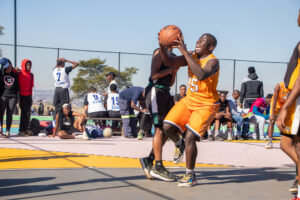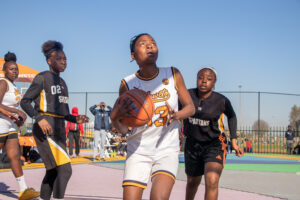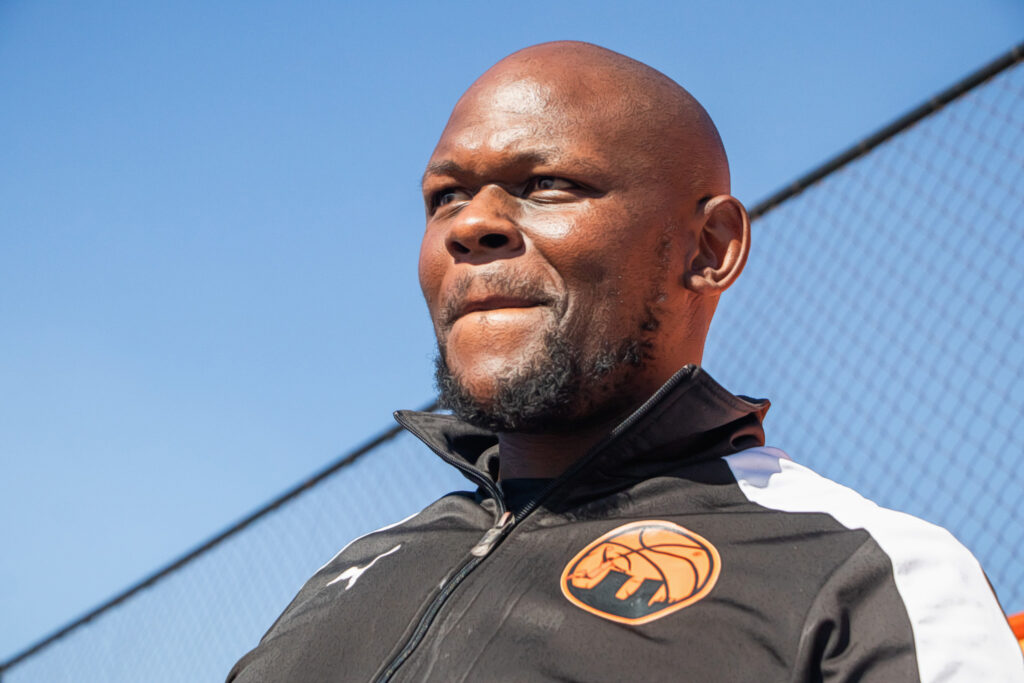Soweto Basketball Academy has been a gateway of opportunity
AFTER discovering basketball late into his teens, Monwabisi Dlamini fell in love with the game, but he never fully realised his playing ambition. Noting this, he vowed to himself that children interested in playing the sport would have the opportunity to access it much earlier in their lives. This gave birth to what he termed his “baby”.
Originally a rugby player, Dlamini was drawn to basketball as an 18-year-old, but by then it was a little late to immerse himself as baller. Instead his desire shifted to help the kids from his community to play the game. And that is how the Soweto Basketball Academy came to life.
Dlamini, who spoke to The Big Tip Off on Youth Day (16 June) during the Soweto Basketball Uprising, a basketball event hosted by his Academy, described himself as a sports lover, but when he discovered the game, things began to make sense.
He says his dream took shape at Jabavu Basketball Courts, which happened to be in a poor state during the establishment of the Academy.
“I am a sports person and played all kinds of sports in my youth. But I had never played basketball a day in my life. After I completed high school, I was blessed to have found this facility we are standing on now. It was an old, dilapidated basketball court, and this is where my love for the game came alive. Fast forward to 2013, I started the Soweto Basketball Academy. And now my baby is the biggest basketball academy in the country,” said the Soweto-born Dlamini.

He explained his inspiration for starting the Academy, which is now 10-years-old, and what it was like transitioning from rugby to basketball.
“I grew up tall, but I was 18 at the time, and it was disappointing that I had discovered the game that late in my life. So now, I want as many kids as possible to get exposure to the game. Especially when they are young,” said Dlamini.
“It was an easy transition [to basketball] because there was no pressure. At that time things began to make sense for me. The first day I played, I said to myself ‘this is it’.”
The Academy has been a basketball home for budding young talent. But the game is not the sole focus of the Soweto-based program. It is part and parcel of the principles that guide this Academy.
“We have three pillars that we abide by. The first one being basketball excellence, the second being academic excellence, and the last being life skills. Many kids are good athletes but struggle in the classroom and with life skills. So, we have to prioritise that for them to be well-rounded youths,” said Dlamini. “Our main focus is grassroots development, and I believe we have done a good job.”
Yes, the work done by Soweto Basketball Academy has been phenomenal that it led to sports apparel brand Puma being their kit sponsor. Dlamini says landing a brand like Puma is a big win for South African basketball, and he hopes other teams around the country land similar opportunities.
“We have worked so hard that we have managed to secure a big brand like Puma, and that is huge. In South Africa, no team has a technical partnership with a top two or three sports brand,” said Dlamini. “I hope other teams also get into these partnerships because it’s one of the ways basketball will grow in South Africa. These brands need to see there is value in investing in basketball.”
View this post on Instagram
Also, coaching at the Academy was a gateway for Dlamini to coach South Africa’s under-18 men’s basketball team at the Region 5 Youth Games in Lesotho in 2020. He says coaching the team at the games was an eye-opener which encouraged him to rethink his program.
“It was a beautiful experience because it helped me to see how far we are as a country, in terms basketball development. It helped restructure our vision for the Academy. We don’t want to be the best in the country. We want to be the best in the world,” said Dlamini.
“To get there, we must see what everyone is doing, especially those countries that are ahead of us. That has helped us as coaches and the players in the national team because we were able to impart some knowledge.
“They will let the other kids know that out there, there is Angola and they are good. That is all we want for ourselves as coaches and players. We need exposure to those kinds of competitions.”
The focus shifted to the Soweto Basketball Uprising and the significance of having the festival on Youth Day. Dlamini intimated that it’s a way of bringing people together to celebrate the country’s democratic gains. On a personal level, it was a way of honouring those who came before him.
“I’m not sure if you are aware, but where we are right now is the same trail that the youth of 1976 marched on. The likes Tsietsi Mashinini and Hector Pieterson through here,” said Dlamini.
“For us, this is more than a commemoration. We are celebrating the achievements that we have as country because of what happened in 76. My mom was part of that class. So for us to bring people to Soweto and spend their day in our beautiful township means a lot to us.”

While the events of 1976 played a role in reshaping the political landscape of South Africa, Dlamini lamented that the day is losing its meaning. But hopes the basketball festival can be an outlet where young people engage in more positive activities.
“When we have days like these, especially for us people from Soweto, they spend the day partying and drinking. Yes, it’s a public holiday, but we have to remember what happened on this day,” said Dlamini. “So, if we grow this tournament, I’ll be happy because more youth will spend the weekend or holiday more constructively.”




